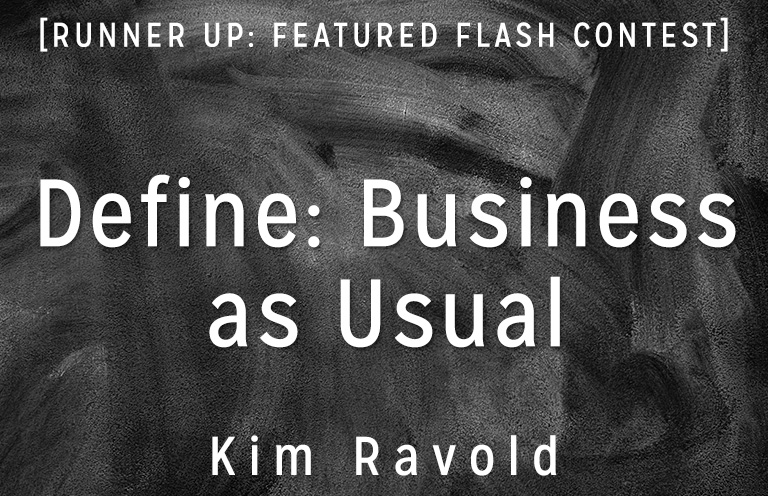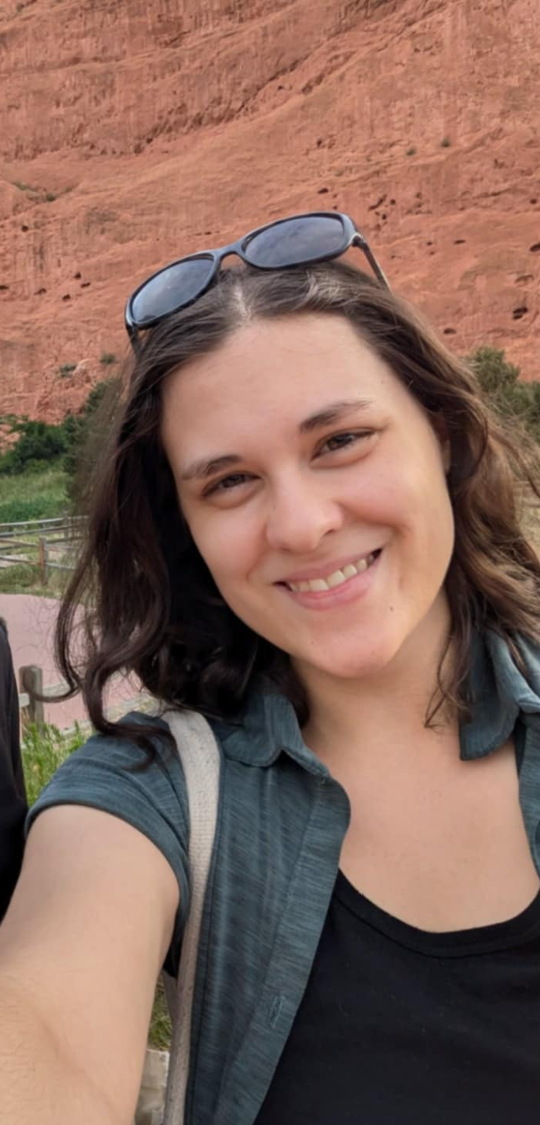Our second Runner Up in this year’s Featured Flash Contest is Kim Ravold with “Define: Business as Usual.” In this piece of sudden CNF, our narrator—a college professor—is forced to manage a situation that has become sadly all too common. Ravold’s prose is carefully crafted to let anxieties come to the surface and get bottled back up as this classroom grapples with what has occurred and how to return to business as usual, if any return is really possible.

I stare at eleven masked faces as eleven masked faces stare at mine. We are discussing vaccine hesitancy and the changing landscape of our scientific knowledge. We are discussing this as if it doesn’t affect us, but we know better. We pretend anyway. In the back, a raised hand waves at me. The voice attached to it asks me a question. This question does not connect to what we’re talking about, and so I have trouble. I ask him to say it again.
What is UHS?
UHS stands for University Health Services. It is a cluster of medical offices, healthcare professionals, an X-ray machine, an acupuncturist on Tuesdays and Thursdays. It is right across the street from us. My right hand points to the open window, the cold air that spills in, but my eyes don’t follow. It’s right there, I say. Right across the street.
My student responds: Oh. There’s a hostile armed person there.
I have trouble with this. I do not understand. I ask him to say it again. He holds up his phone instead. A shuffle of devices in the room as others confirm the emergency alert. My gaze passes through the window and finds the flashing lights.
I move like melting ice. I am measured and unprocessed. I repeat motions that have been bored into me. Enough drills can bore through anything.
The day that I always knew was coming looks different than I thought it would. I do not think about this when I put my hand atop the window. There are contradictions that live within this sill. I know I am supposed to close it. I know I am supposed to leave it open. I was never taught how to triage my way through multiple states of emergency. Is everyone okay if I close this, I almost say, but logic catches me. Window closed. Blinds down. I ask the other students in front of other windows to do the same. Some threats are bigger than others.
I ask someone about something to do with the door, or someone asks something about the door to me. I say yes. I say get the lights too. The lights, I say again. I turn off the projector. We have no use for it now. We imitate a classroom without class.
I retrieve my own phone. I see the alert for myself. There are people I need to text, but there are people in front of me who need me more. I triage.
I ask them how they feel in the same way I ask them how they’re doing with their homework, with the pages of reading and writing I assign them. Gut check, I say, how are you guys feeling? Thumbs up, thumbs down, thumbs in the middle?
I’m scared, comes a voice from the corner.
I tell her that I’m scared too.
I invite everyone to sit on the floor, because that seems safer than sitting at desks. I know we are supposed to huddle together, but I don’t know where. I know we are supposed to keep apart, but the CDC has failed to publish any guidance on our particulars. We are trapped between layers of miserable absurdity. Above us, a too early too big nor’easter cycles on, laughing.
Should we lock the door? Yes, of course we should. We can’t. There’s no lock. Should we stack chairs against it? Sure. That seems a productive use of our time.
I start to tell them stories of the two other times I have been in not-a-drill lockdowns. Midway through, I realize that this is not helpful, so I stop. How was everyone’s weekend, I say instead. Does anyone want an extension on your paper? You can have as many days as you want.
I talk without thinking. My thoughts are elsewhere, stuck on the invisible contract clause that does not come with extra pay, the known and acknowledged fact that, these days, accepting a position as a teacher is the same thing as accepting that one day you will have to decide if you are willing to die for your students. The bright ones, who engage in every discussion with enthusiasm. The shy ones, who have yet to freely venture their thoughts. I evaluate them and their writing because that is my responsibility. It is unclear how far my responsibilities to them extend.
Unclear too is the all clear signal. The Resume Normal Activities text. A student at the window says they see someone in cuffs, but I can’t bring myself to look. I have trouble with this. I am not ready for it to be over. I am too distracted by my half-formed plans to weather us through. The story circles or picnic games to divert our attention away from our fragile safety, the number for the police that I will have to call if it comes to that. I am late to the realization of my own shaking hands. They guide me through this new directive. The business as usual. The opened windows in October rain, 50 degrees and counting. My long-haul lungs starved for air, unable to keep up with this spike in my heart rate.
I cancel my next class. I send out emails to give everyone an extra day on their paper. I link them to the university counseling website, even as I know there is no space there for our newly acquired trauma. A student writes me back to apologize for her anxiety in the moment, and it just about shatters me. On the walk to my car, I pass through buildings of people who appear unaffected. Fear does not come for us in equal measure. When I finally look at my phone, I count the space between alerts. Five minutes. How naïve we were, catastrophizing, replaying archives in our heads of the headlines we might have become, not knowing that this would all be over soon.
I stop by Pita Pocket on the way home, the steering wheel liquid in my hands. I’m not hungry, but I am. Do you want olives, I am asked. Why not, I say. Might as well. Live a little.
Inside my apartment, I turn on the TV. Breaking news comes in the way of a room full of politicians refusing to compromise. My phone buzzes with an email notifying me of a sizable donation made to the Computer Science department. I make a mug of tea that I forget about. I text a friend. They reply, Jesus Christ. And then, I’m glad you’re okay. And then, I’m having a Halloween party this Friday. Do you want to come?
My hands are still shaking.
 Kim Ravold lives in Colorado. She holds a BA from Colgate University and an MFA from UMass, Amherst. Her writing centers on our various perceptions of time and space. More of her work can be found in Redivider and poetry.onl.
Kim Ravold lives in Colorado. She holds a BA from Colgate University and an MFA from UMass, Amherst. Her writing centers on our various perceptions of time and space. More of her work can be found in Redivider and poetry.onl.
